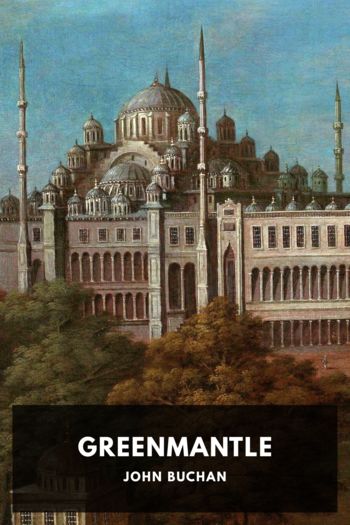Greenmantle - John Buchan (free ebook reader for iphone .TXT) 📗

- Author: John Buchan
Book online «Greenmantle - John Buchan (free ebook reader for iphone .TXT) 📗». Author John Buchan
I talked the thing over with Peter, and he agreed that we were fairly up against it. We decided to go to Kuprasso’s that afternoon, and to trust to luck for the rest. It wouldn’t do to wander about the streets, so we sat tight in our room all morning, and swapped old hunting yarns to keep our minds from the beastly present. We got some food at midday—cold mutton and the same cheese, and finished our whisky. Then I paid the bill, for I didn’t dare to stay there another night. About half-past three we went into the street, without the foggiest notion where we would find our next quarters.
It was snowing heavily, which was a piece of luck for us. Poor old Peter had no greatcoat, so we went into a Jew’s shop and bought a ready-made abomination, which looked as if it might have been meant for a dissenting parson. It was no good saving my money when the future was so black. The snow made the streets deserted, and we turned down the long lane which led to Ratchik ferry, and found it perfectly quiet. I do not think we met a soul till we got to Kuprasso’s shop.
We walked straight through the café, which was empty, and down the dark passage, till we were stopped by the garden door. I knocked and it swung open. There was the bleak yard, now puddled with snow, and a blaze of light from the pavilion at the other end. There was a scraping of fiddles, too, and the sound of human talk. We paid the negro at the door, and passed from the bitter afternoon into a garish saloon.
There were forty or fifty people there, drinking coffee and sirops and filling the air with the fumes of latakia. Most of them were Turks in European clothes and the fez, but there were some German officers and what looked like German civilians—Army Service Corps clerks, probably, and mechanics from the Arsenal. A woman in cheap finery was tinkling at the piano, and there were several shrill females with the officers. Peter and I sat down modestly in the nearest corner, where old Kuprasso saw us and sent us coffee. A girl who looked like a Jewess came over to us and talked French, but I shook my head and she went off again.
Presently a girl came on the stage and danced, a silly affair, all a clashing of tambourines and wriggling. I have seen native women do the same thing better in a Mozambique kraal. Another sang a German song, a simple, sentimental thing about golden hair and rainbows, and the Germans present applauded. The place was so tinselly and common that, coming to it from weeks of rough travelling, it made me impatient. I forgot that, while for the others it might be a vulgar little dancing-hall, for us it was as perilous as a brigands’ den.
Peter did not share my mood. He was quite interested in it, as he was interested in everything new. He had a genius for living in the moment.
I remember there was a drop-scene on which was daubed a blue lake with very green hills in the distance. As the tobacco smoke grew thicker and the fiddles went on squealing, this tawdry picture began to mesmerize me. I seemed to be looking out of a window at a lovely summer landscape where there were no wars or danger. I seemed to feel the warm sun and to smell the fragrance of blossom from the islands. And then I became aware that a queer scent had stolen into the atmosphere.
There were braziers burning at both ends to warm the room, and the thin smoke from these smelt like incense. Somebody had been putting a powder in the flames, for suddenly the place became very quiet. The fiddles still sounded, but far away like an echo. The lights went down, all but a circle on the stage, and into that circle stepped my enemy of the skin cap.
He had three others with him. I heard a whisper behind me, and the words were those which Kuprasso had used the day before. These bedlamites were called the Companions of the Rosy Hours, and Kuprasso had promised great dancing.
I hoped to goodness they would not see us, for they had fairly given me the horrors. Peter felt the same, and we both made ourselves very small in that dark corner. But the newcomers had no eyes for us.
In a twinkling the pavilion changed from a common saloon, which might have been in Chicago or Paris, to a place of mystery—yes, and of beauty. It became the Garden-House of Suliman the Red, whoever that sportsman may have been. Sandy had said that the ends of the earth converged there, and he had been right. I lost all consciousness of my neighbours—stout German, frock-coated Turk, frowsy Jewess—and saw only strange figures leaping in a circle of light, figures that came out of the deepest darkness to make a big magic.
The leader flung some stuff into the brazier, and a great fan of blue light flared up. He was weaving circles, and he was singing something shrill and high, whilst his companions made a chorus with their deep monotone. I can’t tell you what the dance was. I had seen the Russian ballet just before the war, and one of the men in it reminded me of this





Comments (0)